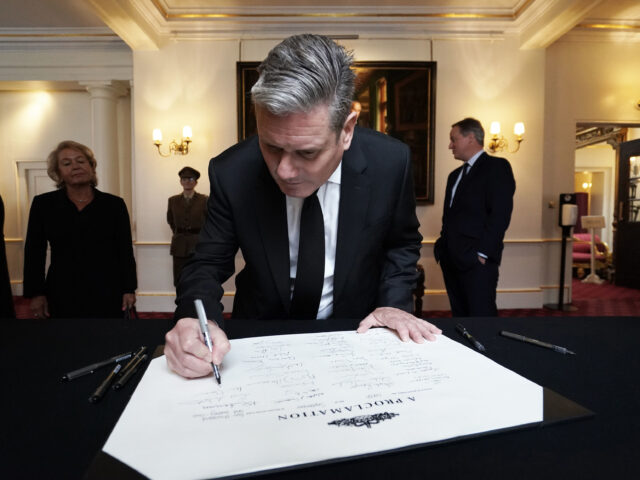The atheist leader of Britain’s leftist Labour Party declined to take an oath swearing allegiance before God to King Charles III.
Sir Keir Starmer, the head of Britain’s leftist Labour Party, declined to take the standard oath of allegiance to Britain’s new monarch, opting for a “solemn affirmation” instead.
It comes as significant figures within the British parliament renew their oaths to the country’s monarchy, swearing to God that they will “be faithful and bear true allegiance” to the new King, as well as his heirs and successors as set out under law.
While many politicians — such as newly minted Prime Minister Liz Truss — swore the traditional oath on Saturday, others opted against making any sort of oath before God, according to The Telegraph.
Of those listed by the publication as abstaining from the oath, Sir Keir is perhaps the most prominent, with the leader of the opposition offering only a “solemn affirmation” that he would “bear true allegiance to his majesty King Charles” and his heirs.
According to the BBC, such an affirmation was first introduced in the 1800s as an alternative for MPs whose religious faith forbid the taking of oaths, with the state-owned broadcaster listing Quakers as being a particularly prominent group who campaigned for the alternate arrangement.
It has since become popular with atheist lawmakers, with The Telegraph noting that Sir Keir had previously has previously said “I am not of faith, I don’t believe in god”.
Penny Mordaunt, the woke Leader of the House of Commons — a role not to be confused with the positions of House Speaker or Prime Minister — also reportedly opted to take the affirmation over the oath.
The taking of oaths by politicians is just one of many rituals in the United Kingdom involved in the passing of power from the old monarch to the new.
While the metaphysical crown of the United Kingdom is said to pass to the heir apparent at the moment of a monarch’s death, there nevertheless exist a number of traditions designed to cement the legitimacy of the new Sovereign in the eyes of the public and the wider world.
Such rituals are now set to take place over the coming weeks and months in Britain as the country comes to accept its new King, Charles III, as its lawful ruler.
The culmination of which will be the King’s coronation, which The Telegraph suggests will likely take place in the Spring or Summer of next year after a period of mourning for the late Queen.
In the meantime, the King will have to contend with challenges to his authority both inside and outside his United Kingdom, with many in the Commonwealth Realms, in particular, demanding referendums on dumping the monarchy in the wake of Queen Elizabeth II’s death.
This includes the head of Australia’s Green Party, Adam Bandt, who said in the immediate aftermath of her death that it was time for the country to “move forward” and “become a Republic”.

COMMENTS
Please let us know if you're having issues with commenting.